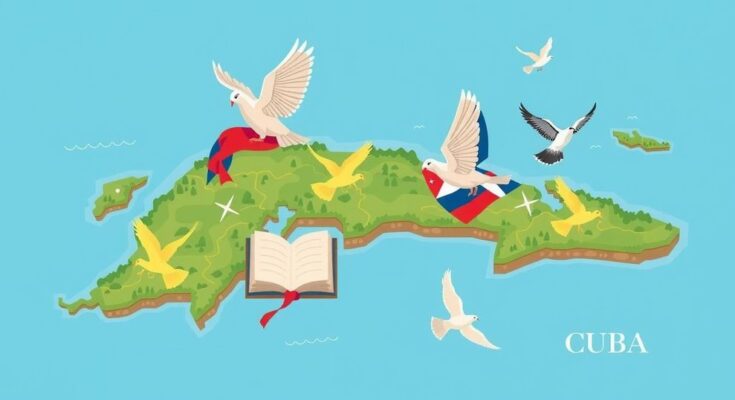The U.S. State Department has reinstated some funding for Cuba’s democratic initiatives, but key programs like Radio Martí have been suspended. Organizations like Cubanet and Cubalex receive renewed support, yet face reduced funding overall. The uncertainty surrounding the administration’s commitment to Cuba’s democracy raises concerns for future aid and operations of independent outlets.
The U.S. State Department has reinstated certain contracts to support independent news outlets, humanitarian aid, and political prisoners in Cuba, reversing previous cancellations. Despite this, the administration’s commitment to Cuban democracy remains questionable, especially after the cessation of Radio Martí broadcasts, which have aired for 40 years.
Cubanet, the oldest independent Cuban news outlet in Miami, confirmed it will continue receiving funding, although ongoing reviews of the contract were mentioned. Several Cuba-related initiatives retained support despite drastic cuts affecting 83% of USAID’s programs, as noted by Secretary of State Marco Rubio.
Cubalex, which provides legal aid to dissidents and tracks arbitrary arrests, also announced the reinstatement of previously suspended awards. However, both Cubalex and Outreach AID to the Americas faced significant funding losses. The International Republican Institute retained only five out of 95 awards, still managing to support essential projects related to Cuba and Venezuela.
The recent efforts to promote democracy in these regions have historically enjoyed bipartisan support, but this has been challenged by the Trump administration’s focus on reducing governmental costs and personnel. Radio Martí’s suspension is indicative of these administrative changes.
The closure of Radio Martí, fulfilling a longstanding goal of the Cuban government, provoked outrage within the Cuban exile community, inciting responses from Congressional members such as Rep. Mario Díaz-Balart. He committed to overturning this decision while reaffirming the continued allocation of funds for essential communications.
Uncertainty now hovers over the future of various organizations aiding Cuba, perplexing many involved in humanitarian efforts. With insufficient clarification on the administration’s strategy, there is a feeling of stagnation and lack of support for ongoing projects.
Enrique Roig noted the lack of staffing related to grant management, impacting the ability to meet the needs of independent journalists in the region. Meanwhile, the National Endowment for Democracy stated that some funds had been released, yet their future remains uncertain. Organizations like Cubalex and El Toque are now striving to identify alternative funding sources to sustain their critical operations amid the shifting policy landscape.
In summary, while the Trump administration has reinstated some democratic programs for Cuba, the cessation of Radio Martí broadcasts raises significant concerns regarding commitment to democracy in the region. The ongoing uncertainty around funding, alongside cuts to various humanitarian initiatives, has cast a shadow over the future of independent Cuban media and advocacy organizations. Without clear guidance from the administration, many entities face challenges in continuing their vital work.
Original Source: www.miamiherald.com




